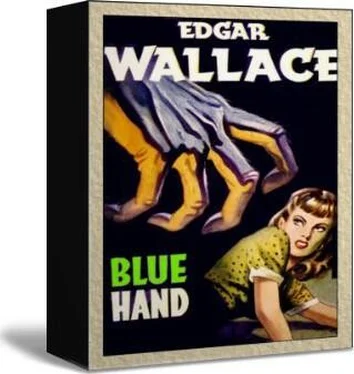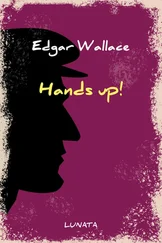Edgar Wallace - Blue Hand
Здесь есть возможность читать онлайн «Edgar Wallace - Blue Hand» весь текст электронной книги совершенно бесплатно (целиком полную версию без сокращений). В некоторых случаях можно слушать аудио, скачать через торрент в формате fb2 и присутствует краткое содержание. Год выпуска: 0101, Жанр: Старинная литература, на английском языке. Описание произведения, (предисловие) а так же отзывы посетителей доступны на портале библиотеки ЛибКат.
- Название:Blue Hand
- Автор:
- Жанр:
- Год:0101
- ISBN:нет данных
- Рейтинг книги:3 / 5. Голосов: 1
-
Избранное:Добавить в избранное
- Отзывы:
-
Ваша оценка:
- 60
- 1
- 2
- 3
- 4
- 5
Blue Hand: краткое содержание, описание и аннотация
Предлагаем к чтению аннотацию, описание, краткое содержание или предисловие (зависит от того, что написал сам автор книги «Blue Hand»). Если вы не нашли необходимую информацию о книге — напишите в комментариях, мы постараемся отыскать её.
Blue Hand — читать онлайн бесплатно полную книгу (весь текст) целиком
Ниже представлен текст книги, разбитый по страницам. Система сохранения места последней прочитанной страницы, позволяет с удобством читать онлайн бесплатно книгу «Blue Hand», без необходимости каждый раз заново искать на чём Вы остановились. Поставьте закладку, и сможете в любой момент перейти на страницу, на которой закончили чтение.
Интервал:
Закладка:
She puzzled him more than he puzzled her.
“What are you smiling at?” he asked curiously, and as she looked at him the smile faded from her face. “You are thinking that you will be rescued at Rugby,” he bantered.
“Rugby,” she said quickly. “Is that where the train stops?” And he grinned.
“You’re the most surprising person. You are constantly trapping me into giving you information,” he mocked her. “Yes, the train will stop at Rugby.” He looked at his watch and she heard him utter an exclamation. “We are nearly there,” he said, and then he took from the little silk bag he carried in his role of an elderly woman a small black case, and at the sight of it Eunice shrank back.
“Not that, not that,” she begged. “Please don’t do that.”
He looked at her.
“Will you swear that you will not make any attempt to scream or cry out so that you will attract attention?”
“Yes, yes,” she said eagerly. “I will promise you.”
She could promise that with safety, for if the people on the platform did not recognize her, her case was hopeless.
“I will take the risk,” he said. “I am probably a fool, but I trust you. If you betray me, you will not live to witness the success of your plans, my friend.”
CHAPTER THIRTY-EIGHT
SHE breathed more freely when she saw the little black case dropped into the bag, and then the speed of the train suddenly slackened and stopped with such a violent jerk that she was almost thrown from the seat.
“Is there an accident?”
“I don’t think so,” said Digby, showing his teeth mirthlessly. He had adjusted his wig and his bonnet and now he was letting down the window and looking out into the night. There came to his ears a sound of voices up the line and a vista of signal lamps. He turned to the girl as he opened the door.
“Come along,” he commanded sharply, and she stood aghast.
“We are not in the platform.”
“Come out quickly,” he snarled. “Remember you promised.”
With difficulty she lowered herself in the darkness and his arm supported her as she dropped to the permanent way. Still clutching her arm, they stumbled and slid down the steep embankment and came presently to a field of high grass. Her shoes and stockings were sodden by the rain which was falling more heavily than ever, and she could scarcely keep her feet, but the hand that gripped her arm did not relax, nor did its owner hesitate. He seemed to know the way they were going, though to the girl it was impossible to see a yard before her.
The pitiless rain soaked her through and through before she had half crossed the field. She heard Digby curse as he caught his foot in his skirt, and at any other time she might have laughed at the picture she conjured up of this debonair man, in his woman’s dress. But now she was too terrified to be even amused.
But she had that courage which goes with great fear. The soul courage which rises superior to the weakness of the flesh.
Once Digby stopped and listened. He heard nothing but the patter of the rain and the silvery splash of the water as it ran from the bushes. He sank on his knees and looked along the ground, striving to get a skyline, but the railway embankment made it impossible. The train was moving on when the girl looked back, and she wondered why it had stopped so providentially at that spot.
“I could have sworn I heard somebody squelching through the mud,” said Digby. “Come along, there is the car.”
She caught the faint glimmer of a light and immediately afterwards they left the rough and soggy fields and reached the hard road, where walking was something more of a pleasure.
The girl had lost one shoe in her progress and now she kicked off the other. It was no protection from the rain, for the thin sole was soaked through, so that it was more comfortable walking in her stockinged feet.
The distance they had traversed was not far. They came from the side-lane on to the main road, where a closed car was standing, and Digby hustled her in, saying a few low words to the driver, and followed her.
“Phew, this cursed rain,” he said, and added with a laugh! “I ought not to complain. It has been a very good friend to me.”
Suddenly there was a gleam of light in the car. He had switched on a small electric lamp.
“Where are your shoes?” he demanded.
“I left them in the field,” she said.
“Damn you, why did you do that?” he demanded angrily. “You think you were leaving a clue for your lover, I suppose?”
“Don’t be unreasonable, Mr. Groat. They weren’t my shoes, so they couldn’t be very much of a clue for him. They were wet through, and as I had lost one I kicked off the other.”
He did not reply to this, but sat huddled in a corner of the car, as it ran along the dark country road.
They must have been travelling for a quarter of an hour when the car stopped before a small house and Digby jumped out. She would have followed him, but he stopped her.
“I will carry you,” he said.
“It is not necessary,” Eunice replied coldly.
“It is very necessary to me,” he interrupted her. “I don’t want the marks of your stockinged feet showing on the roadside.”
He lifted her in his arms; it would have been foolish of her to have made resistance, and she suffered contact with him until he set her down in a stone passage in a house that smelt damp and musty.
“Is there a fire here?” He spoke over his shoulders to the chauffeur.
“Yes, in the back room. I thought maybe you’d want one, boss.”
“Light another,” said Digby. He pushed open the door, and the blaze from the fire was the only light in the room.
Presently the driver brought in an oil motor-lamp. In its rays Digby was a ludicrous spectacle. His grey wig was soaked and clinging to his face; his dress was thick with mud, and his light shoes were in as deplorable a condition as the girl’s had been.
She was in a very little better case, but she did not trouble to think about herself and her appearance. She was cold and shivering and crept nearer to the fire, extending her chilled hands to the blaze.
Digby went out. She heard him still speaking in his low mumbling voice, but the man who replied was obviously not the chauffeur, though his voice seemed to have a faintly familiar ring. She wondered where she had heard it before, and after awhile she identified its possessor. It was the voice of the man whom she and Jim had met coming down the steps of the house in Grosvenor Square.
Presently Digby came back carrying a suitcase.
“It is lucky for you, my friend, that I intended you should change your clothes here,” he said as he threw the case down. “You will find everything in there you require.”
He pointed to a bed which was in the corner of the room.
“We have no towels, but if you care to forgo your night’s sleep, or sleep in blankets, you can use the sheets to dry yourself,” he said.
“Your care for me is almost touching,” she said scornfully, and he smiled.
“I like you when you are like that,” he said in admiration. “It is the spirit in you and the devil in you that appeal to me. If you were one of those puling, whining misses, all shocks and shivers, I would have been done with you a long time ago. It is because I want to break that infernal pride of yours, and because you offer me a contest, that you stand apart from, and above, all other women.”
She made no reply to this, and waited until he had gone out of the room before she looked for some means of securing the door. The only method, apparently, was to place a chair under the door-knob, and this she did, undressing quickly and utilizing the sheet as Digby had suggested.
The windows were shuttered and barred. The room itself, except for the bed and the chair, was unfurnished and dilapidated. The paper was hanging in folds from the damp walls, and the under part of the grate was filled with the ashes of fires that had burnt years before, and the smell of decay almost nauseated her.
Читать дальшеИнтервал:
Закладка:
Похожие книги на «Blue Hand»
Представляем Вашему вниманию похожие книги на «Blue Hand» списком для выбора. Мы отобрали схожую по названию и смыслу литературу в надежде предоставить читателям больше вариантов отыскать новые, интересные, ещё непрочитанные произведения.
Обсуждение, отзывы о книге «Blue Hand» и просто собственные мнения читателей. Оставьте ваши комментарии, напишите, что Вы думаете о произведении, его смысле или главных героях. Укажите что конкретно понравилось, а что нет, и почему Вы так считаете.












